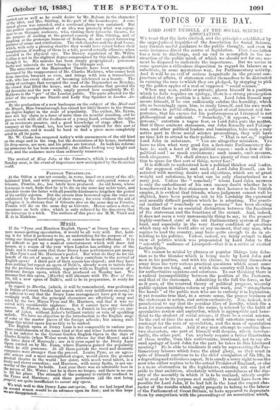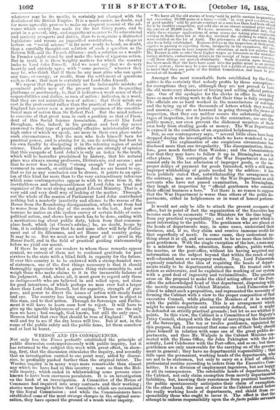TOPICS OF THE DAY.
LORD JOHN RUSSELL AT THE SOCIAL SCIENCE
ASSOCIATION.
WE trust that the facts elicited, and the principles established by the unprejudiced inquiries of the Association for Social Science, may furnish useful guidance to the public thought, and even some instances direct the course of legislation. That Association has a task to discharge, and an end to accomplish in the in- struction of the public mind, of which we should not for one mo- ment be disposed to underrate the importance. But we notice iii some quarters a ridiculous disposition to regard its labours as a substitute, in some mysterious way, for Parliamentary activity. And it will be an evil of serious magnitude in the present con- juncture of affairs, if statesmen suffer themselves to be distracted in running the race to which they are pledged, by stopping to pick up the golden apples of a real or supposed " social science." When any man, public or private, places himself in a position which he feels requires an apology, there is a strong presumption afforded that the position is a false one. Lord. John Russell may assure himself, if he can sufficiently subdue the humility, which sits so becomingly upon him, to study himself, and his own work and status in public affairs, as a subject of real interest and im- portance, that his excuse for his performances at Liverpool is not philosophical or sufficient. " Somebody," it appears, or " some persons," entertain a vague fear, as Lord John puts the matter, that if these eminent statesmen, our John Russells and Paking- tons, and other political leaders and luminaries, take such a very active part in these social science proceedings, they will have no time left to attend to their politics. " That is not so," replies Lord John in substance. "You are altogether mistaken. You have no idea what very good fun a first-rate Parliamentary de- bate is : such a feast of the political reason : such a flow of the political soul ! so much excitement; such taunts, such sarcasm, such eloquence. We shall always have plenty of time and atten- tion to spare for that sort of thing, never fear."
It is difficult to understand how a political thinker and leader, of the supposed calibre and rank of Lord John Russell, can be satisfied with meeting doubts and objections, which are of great weight and substance, by what can be only characterized as a sorry jest. Unless the " somebody" whom Lord John answers is only the embodiment of his own uneasy doubt whether he is henceforward to be first statesman or first lecturer to the British empire, it is evident that friends, whose judgment cannot well be slighted, have been pointing out to his Lordship the equivocal and morally difficult position which he is adopting. The practi- cal instinct of " somebody or some persons" has been showing them that there is an essential distinction between the functions of the statesman and the functions of the savant. And, indeed, it does not seem a very unreasonable thing to say, in the present highly-confused state of the old Parliamentary system of Eng- land, and especially in the very thorny condition of questions which may set the world afire at any moment, that any man, who aspires to lead the country, may have quite enough to do in at- tending to his politics. Unless, indeed, we fairly submit to that view of politics which was propounded by Lord John to the " scientific" audience of Liverpool—that it is a series of excited faction fights.
We cannot be misled by phrases or popular likings into delu- sion as to the blunder which is being made by Lord John and men in his position, and with his claims, in turning themselves away from the very serious practical questions which must come before them ere long, and of which the country will look to them for authoritative opinions and solutions. To our thinking there is a radical incompatibility between the position of the Professor, and that of the statesman. Admitting to the full the force, so far as it goes, of the received theory of political progress, whereby public opinion initiates reform or public work, awl " strengthens the hands" of the public men who are to embody it in legislation, it yet remains true that, in a severe sense, the proper business of the statesman is action, and action exclusively. Nor, indeed, is it paradoxical to say that the peculiar fibre of faculty, which fits a man for statesmanship worth the name, is relaxed by the habit of speculative review and aspiration, which is appropriate and hem- ficial to the student of social science, if there be a social science. To the end of time the man of action will entertain some sort of contempt for the man of speculation, and the man of speculation for the man of action. And if any man attempt to combine these two characters, one part of himself will despise, albeit involun- tarily, the other part. Can anybody require a better illustration of these truths, than this unfortunate, irrational, not to say ab- surd apology of Lord John for the part he takes in this Liverpool meeting? He is ablate vindicate it only by representing the Par- liamentary labours which form the chief glory, as they must in spite of himself continue to be the chief occupation of his life, in a degrading and ridiculous aspect. It is surely a sorry sight to see the man who either aspires to be the actual Premier of England, or else is a mere obstruction in the legislature, evincing not one jot of pride in that ambition, absolutely without carefulness of the dig- nity of the assembly in which it is to be realized, utterly seepti- cal in soul as to its purpose and reality. It would have been im- possible for Lord. John, if he had felt in the least the august cha- racter of the results which ought properly to belong to the labour of the Parliament of Great Britain, to have appeared to depreciate them by comparison with the proceedings of an association whit+, whatever may be its merits, is certainly not charged with the destinies of the British Empire. It is a much easier, no doubt, and far more agreeable process to make an eloquent resume of the ad- vance which society has made for the last thirty ygars, and to point in a general, airy, and magnificent manner to it educational and sanitary prospects and duties, than to reorganize a distracted legislature and rescue an imperilled constitution. An eloquent lecture on "social science" is far more ready to hand, no doubt, than a carefully thought-out solution of such a question as the Reform Bill, and the French Alliance : such a solution as a would- be Premier might stand by and make the basis of vigorous action. But in truth it is these weighty matters for which the country looks to Lord John Russell. And we must say that we do very heartily and entirely agree with "some persons," whoever they may be, who think that if there be any man alive who can spare any time, or energy, or credit, from the settlement of questions such as these, that man is certainly not Lord John Russell.
We repeat that the grave feature in the fashionable mistake of prominent public men of the present moment in frequenting platforms so assiduously, is, that it indicates a weak sense of their responsibilities and duties, as men of action : indicates, in a word, that they are not naturally men of action ; that their minds are cast in the professorial rather than the practical mould. Perhaps England has never seen a more perfect specimen of the constitu- tional man of action than Sir Robert Peel. But the mind refuses to conceive of that great man in such a position as that of Presi- dent of this Social Science Association. Emeriti like Lord Brougham, who, indeed, in his greatest and best day never answered to that type of practically effective ministerialist of the high order of which we speak, are more in their own place under such circumstances. But the man who feels himself born for practical power, and is aiming for it, can do nothing but hurt to his own faculty by dissipating it in the relaxing region of social science. There are malicious critics who are strongly of opinion that this escapade of Lord John's is only an index to the truth, which will be hereafter proclaimed by history, that his natural place was always among professors, litterateurs, and savans ; and that he never was in reality "strong enough" for posts of go- vernment in smooth, or critical times. And we are bound to say, that so far as any- conclusion can be drawn, it points to an opin- ion of this kind far more than to the very extraordinary inference which some contemporaries appear to wish to draw from it, the inevitableness and indispensableness of Lord John as head and organizer of the next strong and great Liberal Ministry. That is a very odd and very droll way of looking at the matter. Through- out the whole of the session of Parliament Lord John contributed nothing but a masterly inactivity and silence to the rescue of the House from the floundering disorganization, which went from bad to worse from the first day of the session to the last. And now because he makes an able spoken survey of certain fields of socio- political action, and shows how much has to be done, ending with a meritorious tag about public duty, taken from that common- place book, which (at Cicero's advice,) he, no doubt, keeps by him, it is suddenly clear that he and none other will help Parlia- ment out of its ailemmas, and set House and country going. It may be so. But we must see better proof of it : proof in the House itself, and in the field of practical guiding statesmanship before we yield our assent. If there be any of our readers to whom these remarks appear cynical, we entreat of them not to confound gratitude for past services to the state with a blind faith in capacity for the future. If ever this country is to be endowed with a strong-handed race of statesmen, one of the first things necessary is that it should thoroughly appreciate what a grave thing statesmanship is, and weigh those who make claims to it in the inexorable balance of the judgment. And, above all, it must grow to regard only those as indispensable who are believed in and relied upon, not alone for good intentions, of which perhaps no man ever had a larger share than Lord John Russell, but for sagacity, strength of pur- pose, and power to direct the issues of action with steady hand and eye. The country has long enough known how to object to this man, and to that action. Through its Sovereign and Parlia- ment it will have to learn soon how to reject. It will have to give up the ignoble helplessness of saying, "These are the only men we have ; bad enough, God knows, but still the only ones." Heaven forbid that ever that should be true of England! Watch well and try to see if the dry bones will live. But if not, in the name of the public safety and the public fame, let them somehow and at last be burnt.



























 Previous page
Previous page